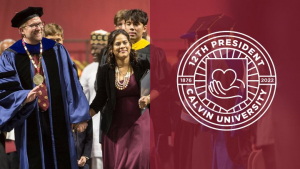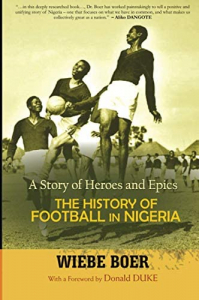Why Sports Matter: A View from Nigeria

The following is an excerpt from Wiebe Boer’s book, The History of Football in Nigeria: A Story of Heroes and Epics.
When teenage football sensation Julius Aghahowa scored two successive goals to save Nigeria’s senior national team, the Super Eagles, from a quarter-final exit at the hands of Senegal in the 2000 African Nations Cup, exuberant fans invaded the National Stadium pitch and held up the match for over 10 minutes. The nail-biting drama and excitement of Nigeria’s come-from-behind victory was too much for pregnant spectator Aishat Oyerinde, who went into pre-term labour but thankfully gave birth to a healthy boy who was appropriately named ‘Julius’. An elderly man watching the match on television in Kano was not so lucky. He suffered a heart attack while leaping for joy, and was completely ignored by fans around him who were more interested in the game than his predicament. Nigerian fans in Ilorin, angry that the electricity had failed while they were watching the match, burnt down the house of Felix Oketunji, an employee of the national power company.
Eighteen months later, on Sunday, July 29, 2001, Nigeria’s Super Eagles defeated Ghana 3-0 in Port Harcourt, Rivers State, to qualify for the 2002 World Cup. A draw or a defeat would have entailed Liberia’s qualification in Nigeria’s place, so all efforts were made to ensure qualification. In the stands that day were Nigeria’s president Olusegun Obasanjo, over a dozen state governors, and numerous dignitaries who felt that their presence would boost the team’s morale. After the match, with their qualification secured, Nigerians in Port Harcourt and across the country began celebrating, as the dignitaries made all sorts of promises regarding what they would do for the players. Encomiums were showered on the all-Nigerian coaching staff, and streets in Port Harcourt were named after Victor Agali and Tijani Babangida, the players who together scored the three goals. Nobody stopped to ask why Babangida, a Northerner against whom the people of the Niger Delta were at the time waging a political battle for resource control, should have a street named after him. It did not matter. On that day, Tijani Babangida was a Nigerian, first and foremost, as was everyone celebrating together, from the President down to the poorest okada driver in the stands…
…In Nigeria, the rhetoric surrounding football is focused on how important the game is to national unity – when the national team plays, Nigerians feel a rare unity of purpose. To illustrate this, let me introduce four quotations, regarding football’s importance to the country. The first is taken from a book on Nigerian football, written by former national team captain turned sportswriter Segun Odegbami:
“When a Nigerian team is engaged in a major international match, the country’s over 80 million people bury their differences (religious, tribal, political, societal and so on) and come together in supporting the country’s representatives. Side by side people sit before radio sets or television sets, or in the terraces at the stadium cheering and wishing the country well.”
The second is from General Abdulsalami Abubakar, then serving as Military President of Nigeria, in his welcome message to those attending the 10th FIFA World Youth Cup in 1999, the biggest sporting event held in Africa up to that date:
“…since the present administration took over, the country has witnessed gradual integration into the international community. It is only most cherished that the game of football which has remained a big symbol of unity and peace in Nigeria, will also finally open up the country to the rest of the world.”
The third quotation is from former Nigerian national team player and coach, Paul Hamilton, speaking during the 2000 African Nations Cup tournament:
“Wherever an organised match is being played anywhere in this country, people from the different ethnic groups come together. When the victory they hope for comes they are united, as if they are from the same womb.”
The final quote is more recent and is from the former Minister of Sports, Bolaji Abdullahi. During the presidential dinner in honour of the Super Eagles after their triumph at the 2013 African Cup of Nations to which I was privileged to attend, Abdullahi said, “Our victory in South Africa is the most precious gift to our nation and we are most grateful. Celebrations in Ibadan are as loud as in Kano, Aba, and Maiduguri. We must insist on our togetherness.”
Where did all this enthusiasm for football in Nigeria come from? How did football become so popular that so much national attention and rhetoric would surround it? This book attempts to address these questions alongside others: How did cultural practices like football introduced from abroad, become indigenised? What were the cultural and practical motivations for the British colonial rulers to introduce football and other leisure activities to Nigeria? Were there differences between the north and the south in the spread and scope of football?
In Nigeria, the rhetoric surrounding football is focused on how important the game is to national unity – when the national team plays, Nigerians feel a rare unity of purpose.
— WIEBE BOER, President of Calvin University, from his book, The History of Football in Nigeria: A Story of Heroes and Epics
Listen to the companion podcast.

Wiebe Boer, here processing in with his wife at his inauguration at Calvin University.

Calvin University President Wiebe Boer’s book, The History of Football in Nigeria: A Story of Heroes and Epics, is a must read during the World Cup!


